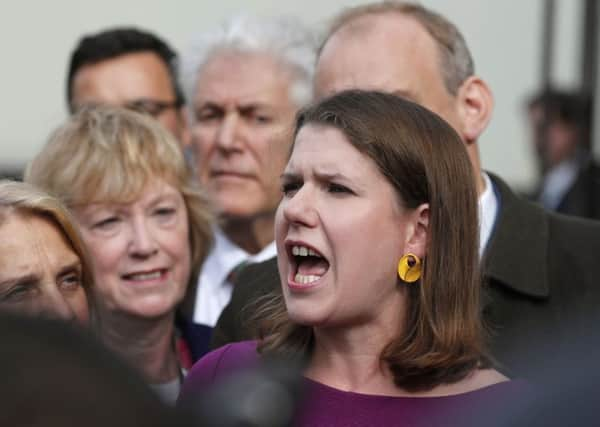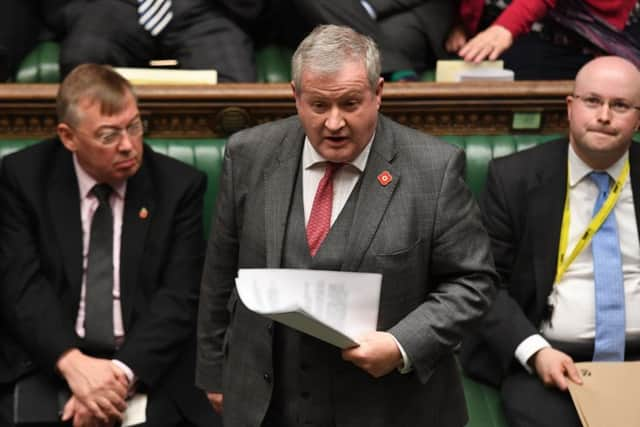General Election 2019: How SNP and Lib Dems may have enabled hard Tory Brexit – Brian Wilson


The likely outcome of the General Election is a Tory majority, followed by whatever kind of Brexit they decree and the generality of their policies for five years.
None of that is certain. Six weeks is a long time in politics and all the usual clichés apply. But the polls can scarcely be ignored so it is reasonable to point out what is “likely” – even if uncertain.
Advertisement
Hide AdAdvertisement
Hide AdIndeed, it is essential to recognise – before it becomes lost in the mists of time and self-exculpation – that this is exactly what those who manoeuvred over the past week for an early election have led us into, eyes wide open.


The most bombastic denouncers of Brexit and general Tory wickedness were transformed overnight into their most cynical enablers. The “madness” of a December poll was magically re-packaged as an irresistible gift to the troubled electorate.
Why did this happen? Why did parties supposedly opposed to Brexit grant Boris Johnson his wish for an election at a time of his choosing? The answer is ultimate proof that “principle” tends to be paraded by those most likely to practice shameless self-interest.
Lord Clegg of Facebook
The posturing of the Liberal Democrats under the rather annoying Ms Swinson would be funny if it was not for its potential implications. These earnest champions of constitutional reform bequeathed us, from their stint in coalition, the Fixed Term Parliament Act.
It was based on the lofty principle that governments should be denied the advantage of calling a General Election when it suited a Prime Minister. Stability for the country mattered more, squeaked the saintly Lib Dems under Lord Clegg of Facebook.
Then along came the sniff of opportunism – not to form a government, which nobody believes, but to garner a handy number of seats by being the “stop Brexit” party, hoovering votes from Tory Remainers and disgruntled non-Corbynites; perhaps enough to become third party in the Commons again.
But hang on. What good is that to the “Stop Brexit Party” if the outcome is to make Brexit more certain than a week ago? What arithmetic have the Lib Dems done which contradicts that expectation – and if the answer is none, then why sell their anti-Brexit souls for a couple of dozen seats?
Hobson’s choice
Then we have Mr Bombast himself, the man who has undone all the good that Gareth Southgate achieved for the reputation of waistcoats. Ian Blackford was assuring us last week that it would be “barking mad” to have a December election. Then the tablets were handed down from Murrell Towers that we were to be led up barking creek.
Advertisement
Hide AdAdvertisement
Hide AdOstensibly it was to get rid of this awful, terrible, add-your-own adjectives Tory Government without delay. Since that is certainly not within the geographical gift of the SNP, it was straight-faced humbug. This was all about short-term party advantage in advance of whatever might be happening in January. I hope they get a well-deserved come-uppance.
I have no illusions about the sources of Labour’s problems but, in this case, they were faced with Hobson’s choice once the Lib Dems and Nationalists had made their accommodations with the Tories. Either support an election which is going to happen anyway or oppose an election which is going to happen anyway. So they split.
There was no need for a General Election and it would be difficult to think of circumstances in which the Fixed Term Parliament Act could have been more relevant to prevent a populist Prime Minister making a pitch to the country because he could not get his way in Parliament.
The lesson of the past week is that cynical opportunism is not the exclusive preserve of populist Prime Ministers. Unusually, perhaps uniquely, my own MP, Angus Brendan MacNeil, got it right. Within six weeks, we could have a five-year Tory government and whatever Brexit they settle upon.
Likely but not certain. However, it is the cynical rush to expose us to that likelihood – in complete contradiction of their purported objectives – that the enablers of this “barking madness” should be remembered for and judged accordingly.